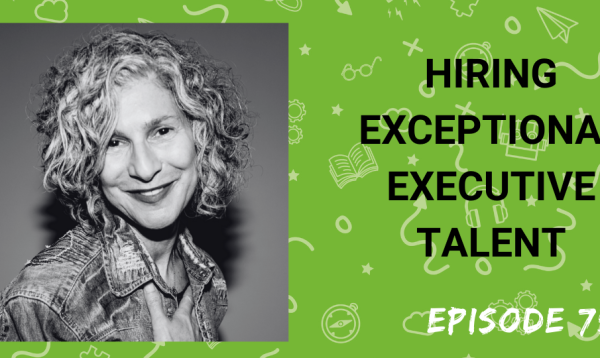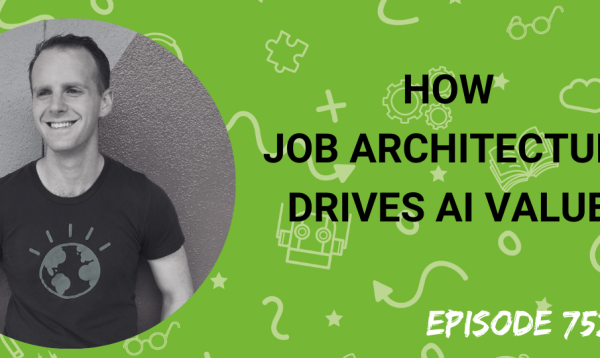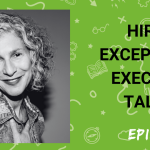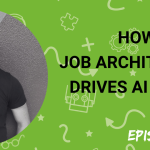Recruiting Future is a podcast that helps Talent Acquisition teams drive measurable impact by developing their strategic capability in Foresight, Influence, Talent, and Technology.
This episode is about Influence and Technology.
When employers invest in talent acquisition technology, they are expecting efficiency gains and improved hiring outcomes. Yet, many organizations find themselves struggling with implementations that fail to deliver promised results and don’t align with the organization’s broader business objectives. So, what’s the key to building transformation strategies that actually work and provide the measurable value that TA teams need?
My guest this week is Sarah Smart, Co-Founder of HorizonHuman. Sarah is a former TA leader who now consults with enterprises around digital transformation. She has seen both the successes and failures of large-scale technology implementations firsthand and has practical insights to share on what makes the difference between a successful transformation and a costly disappointment.
In the interview, we discuss:
• The most significant changes in the talent landscape
• The biggest challenges in TA Transformation
• Aligning with business objectives
• Outcomes, measurement, and sustainment
• Why having a clear vision is critical
• Developing the mindset for transformation
• Building a compelling but realistic business plan
• The skills TA Leaders now need
• What does the AI-driven future look like
Follow this podcast on Apple Podcasts.
Follow this podcast on Spotify.
00:00
Matt Alder
Why do some talent acquisition transformations deliver game changing results while others become expensive disappointments? The difference isn’t the software, it’s whether organizations start with clear outcomes, build realistic business cases, create proper measurement systems, and possess the necessary expertise for sustainable results. Keep listening to find out how you can make your transformation a runaway success. Support for this podcast comes from Greenhouse. Greenhouse is the only hiring software you’ll ever need from outreach to offer. Greenhouse helps companies get measurably better at hiring with smarter, more efficient solutions powered by built in AI. With Greenhouse AI, you can generate stronger candidate pools faster and source high quality talent with more precision. Streamline the interview process with automation tools and make faster, more confident hiring decisions with AI powered reporting.
01:06
Matt Alder
Greenhouse has helped over 7,500 customers across diverse industry verticals from early stage to enterprise become great at hiring, including companies like Airbnb, HubSpot, Lyft, SeatGeek, HelloFresh and DoorDash. If you’re ready to put the power of AI into the hands of your hiring team, you can visit greenhouse.com to learn more.
Matt Alder
Hi there. Welcome to episode 709 of Recruiting Future with me, Matt Alder. Recruiting Future is a podcast that helps talent acquisition teams drive measurable impact by developing their strategic capability in foresight, influence, talent and technology. This episode is about influence and technology. When employers invest in talent acquisition technology, they’re expecting efficiency gains and improved hiring outcomes. Yet many organizations find themselves struggling with implementations that fail to deliver promised results and don’t align with the organization’s broader business objectives.
02:36
Matt Alder
So what’s the key to building transformation strategies that actually work and provide the measurable value that TA teams need? My guest this week is Sarah Smart, Co founder at Horizon Human. Sarah is a former TA leader who now consults with enterprises around digital transformation. She’s seen both the success and failures of large scale technology implementations firsthand and has practical insights to share on what makes the difference between a successful transformation and a costly disappointment. Hi Sarah and welcome to the podcast.
03:13
Sarah Smart
Hi Matt, so nice to be here. Thanks for having me.
03:16
Matt Alder
An absolute pleasure to have you on the show. Please could you introduce yourself and tell us what you do?
03:22
Sarah Smart
Sure. I am Sarah Smart. I am one of the co founders of a consulting company called Horizon Human where we focus on helping HR transform itself.
03:35
Matt Alder
Fantastic. And just tell us a little bit about your background and how you got to do what you do now.
03:40
Sarah Smart
Sure. I have about 25 years in talent acquisition, starting on the executive recruiting side, but eventually working my way up to run the entire corporate function for talent acquisition. I ran it at Hilton Worldwide and was also the head of chase recruiting at JPMorgan Chase. During my evolution from executive recruiting into owning the corporate function, discovered a real passion for technology and technology as an enabler for transformation and certainly in the TA space, technology as a way to create better experiences for candidates, hiring managers and even the recruiters.
04:19
Matt Alder
Fantastic stuff. Want to dig into that? All kind of as we go through our conversation. To start with though, just give us your kind of take on the. What have been the most significant changes around the talent landscape in the last few years? I mean, it’s been an incredibly disruptive time, but what do you think the most significant part of that has been?
04:42
Sarah Smart
There are so many answers to that question. I think the obvious one is AI, which is, you know, changing the landscape for all of HR and frankly all business. So not just intel and acquisition, of course, but I think that there are other things that are sort of maybe aligned with the AI transformation that’s happening, which is there are new ways of thinking about your workers in HR and specifically in talent acquisition. So tech almost as a worker sort of driving this transformation. The large scale implementations of the HCMS that really started to pick up and really sort of hit a crust almost four years ago and the learnings that all of the organizations have after they’ve implemented a large scale hcms.
05:24
Sarah Smart
And I think for me the big learning is four years ago, five years ago, when were starting to embark on the large scale technology transformation in hr. I think companies thought we could just flip a switch and it would be easy. You would implement the software and walk away, dust your hands off, you would get your efficiencies and everything would be done. And I think we have learned that is not the case. Companies are finding it harder than expected. And that’s where we come in. That’s where Horizon Human comes in and really helps guide and help them think about what didn’t they consider and what do they need to change. So technology writ large is the transformation driver for talent acquisition.
06:06
Sarah Smart
But I think there, you know, across hr, there is also drive to create a better experience for all of your users and a more consumer like experience.
06:16
Matt Alder
Yeah, I agree with you 100% there. And how would you sort of break down the biggest challenges that employers have when they’re doing a tight acquisition transformation? You know, what are the biggest things to consider?
06:28
Sarah Smart
Wow, there are so many to consider. But I would start at the beginning, which is what outcomes are you trying to drive? And I think in my experience, and I’ve learned this the hard way, and I have also been able to work with clients to make it easier. Right. Which is if you start with a solution, I’m in love with X product and I’m going to implement that because I saw it at a conference or I talked to my friend and they have it implemented at their company and you don’t start with your outcomes in mind, you inevitably end up with a solution that probably isn’t aligned to business outcomes. So, you know, I’ll break it down a little bit further.
07:08
Sarah Smart
So for us, when we think about ta, we’re thinking obviously about efficiency, but then we’re also thinking about experience and experiences impacts to the TA outcomes that you’re trying to drive, which is generally faster speed of hire with higher quality candidates that stay longer and there are multiple solutions that you can apply to create those outcomes. When you’re doing that work, it’s really important to sit back and say, okay, not only is the outcome, I want to apply measurements to this. So I want to understand what are my baselines today and then what do I expect to have happen post transformation and how am I going to measure that consistently along the way. So measurement would be the second piece. So start with outcomes, ensure that you’re constantly measuring and seeing whether your implementations are having an impact.
07:59
Sarah Smart
And I think the last piece is one that is maybe a cautionary tale for all of hr, not just talent acquisition, which is make sure that you’re building a sustainment model and a sustainment team with expertise in the technology that you’re implementing. And that may mean that your business case going in. So savings that you may have expected to receive by investing in technology may be less, but the amount of expertise that you need probably doesn’t reside in talent acquisition or even in HR tech today.
08:29
Matt Alder
Yeah, again, that kind of makes sense. And when people are sort of focusing on the business problems that they’re solving and the outcomes that they want from these transformations, do you think it’s also important to have a bigger picture, kind of an overall vision about where things are going? Particularly when things change so quickly at the moment, it can be quite difficult, I think sometimes for people to even know what direction they’re going in?
08:55
Sarah Smart
I completely agree, I completely agree with your statement on change. We are in a very dynamic environment right now. I thinking about flexibility in the solutions that you design is critical. Designing solutions that can be easily adapted for multiple regions, for multiple countries, for multiple laws, for multiple use cases is really important. And I think that’s actually one of the things that much of talent acquisition is learning about the large scale hcms that were implemented over the past couple of years, which is they’re not flexible. And the flexible, you know, the flexible solutions are really taking on these large scale solutions. The, the biggest, you know, the big implementations and for good reason.
09:46
Matt Alder
And how do you think that market is going to develop? Because obviously there’s so many technology, AI technology startups out there and HR tech continues to sort of evolve. Do you think that the kind of position of those sort of big, kind of, as you say, inflexible solutions is going to be properly challenged?
10:06
Sarah Smart
Not yet. And I would expect that those large solutions will also be looking to speed up their roadmaps, right, become more agile themselves and really start anticipating market trends that they can implement not on an 18 month roadmap, but maybe in like a three month roadmap. And so I think their ways of working need to evolve as well. So when I look out at the challengers out there, they’re established brands, they’re brands that we all know, they’re companies that we have all worked with and they’re continuing to iterate on their product in a way that’s very compelling. And part of what’s making it compelling is their speed to market.
10:46
Matt Alder
Yeah, no, absolutely. And earlier in the conversation you sort of talked about the magic bullet here. Isn’t the thing that you just kind of implement it and you solve all your problems and you’ve talked about the challenges and you know, going through that transformation. What do you think the sort of the best mindset for people to have when it comes to technology when they’re sort of approaching a transformation like this?
11:09
Sarah Smart
Sure. I would caution on two things. One is falling in love with a solution sometimes and this has probably happened to the best of us. We have a great sales experience, we develop a rapport with our sales team and they’re telling us all of the amazing things that this product is going to help us do and we believe them and then we implement the product and the product maybe isn’t working as expected. Maybe the use case wasn’t suited for our environment. Maybe the technology is not working as expected. Maybe the sustainment model isn’t available. Presuming that, you know, when that happens, you need to be able to go back to the company, go back to your technology partner and say to them, listen, what you sold me isn’t working as I expected it would. I’m not getting the business results that I needed.
12:05
Sarah Smart
And we need to work together to resolve it. And you need companies that are willing to lean in on that. So when you fall in love with a solution expecting the results, as opposed to actually falling in love with the problem, which is the business problem that you’re trying to solve. So there’s, I think that’s one element of the challenges that people have when they’re implementing technology is falling in love with a solution. And then I think the other side is really assuming that your business case is going to be delivered. Too often companies will create efficiencies through their technology investment and they’ll commit to efficiencies through their technology investment, some of which are very challenging to realize. When you get to the end of your implementation and you realize what you need to actually run the technology that you purchased.
12:51
Matt Alder
And how could people better at doing that upfront? Because obviously there’s an imperative to articulate that business value in order to get the project and the investment signed off. How can people sort of balance being realistic about the outcomes, but also making them compelling enough to actually get the investment to buy the technology and do the transformation?
13:15
Sarah Smart
I think the first thing that I’d advise is surround yourself with experts. So if you’re contemplating a technology purchase for your organization related to HR or related to ta, don’t investigate that as a singular TA or HR leader. Don’t you know, include your technology leader in those conversations and potentially even include an outside expert in those conversations? And the reason that I’m insisting on sort of the partnership between HR and technology here is that sometimes HR will go on their own, or sometimes technology will go on their own. And if technology goes out and selects a product or identifies a product, they may not understand all the use cases that HR is struggling with and where their biggest business priorities are. And if HR goes out and selects it on its own, HR doesn’t understand the technical implications of in.
14:03
Sarah Smart
Of implementation or the challenges in sustainment. And so we’ll probably take a smaller business case. And likewise, technology will overestimate how much savings there could possibly be. If you have the two in partnership working together and the two teams in partnership working together really kicking the tires on products before purchasing, I think you get a much better outcome and you get a much more balanced business case. So that partnership is critical and I think part of the transformation that we’re going to See in HR over the coming years is HR leaders that are very technologically savvy or technology leaders that really understand the use cases in HR and that those are the leaders of the future.
14:46
Matt Alder
And I suppose leading on from that and also coming back to what you were saying earlier about the skills that people need for these transformations not necessarily existing within TA or HR, but what skills did TA leaders need, I suppose themselves to be able to develop and drive, you know, transformation in their functions moving forward. What is it they need to focus on?
15:09
Sarah Smart
I love this question. You know, 10 years ago, TA leaders needed to be savvy about their business. They needed to know how to motivate and lead a team and they needed to know how to basically tell a story about their business results. You need all of those things today. But then you also need to have real business acumen, being able to model out the impacts of technology on your business, being able to talk about getting down to the nitty gritty beyond cost per hire. What are you delivering in terms of quality and measuring? So you’re going to add in a lot of what I would call advanced analytics experience into a TA leader skill set that I think is required today and will be required in the future and then real technology know how.
15:55
Sarah Smart
And it could be that you’re starting to see technologists becoming heads of TA or heads of hr because technology is now becoming a worker in the work stream of talent acquisition. Now we are automating to the point where you can say, okay, great, I can have an army of AI agentic enabled bots that are going to be able to deliver to me services that maybe I used to have people inside my TA team do that work. That means that you need to know how to design your business process. So that’s sort of the another leg of the stool which is really deeply understanding mapping your business processes and being able to understand the change that technology is going to drive across that.
16:38
Sarah Smart
So when you look at the skill set, it becomes much more of a well rounded business leader as opposed to a TA subject matter expert.
16:46
Matt Alder
No, absolutely. And you talking about the future, where’s AI going to take all this? What do you think the talent function of the future is going to look like in the age of AI?
16:57
Sarah Smart
I think it can look like a lot of different things from my ideal future state. And I think about where companies could take if they wanted to invest in this way in ta, you could have inside of TA a team that is helping you to build your own large language models to enable the work that you want to do for your specific use cases in talent acquisition, because ultimately your use cases may not be served by many of the products out there. And we also don’t want to go back to the days of having so many different HR products serving HR or talent acquisition needs. You still want to keep it consolidated. So how do you know, you build this army of technologists. It’s not, it’s not, it doesn’t need to be an army, but it is. It’s data science. It is data architecture.
17:42
Sarah Smart
It is being able to very quickly and agilely build a product inside of ta, test it, fail, learn from that, and then implement again. So the product operating model, I think you’re going to start to see a lot more in talent acquisition and hr, and indeed we’re seeing that in major companies today.
18:00
Matt Alder
Sarah, thank you very much for talking to me.
18:03
Sarah Smart
My pleasure.
18:04
Matt Alder
My thanks to Sarah. You can follow this podcast on Apple Podcasts on Spotify or wherever you listen to your podcasts. You can search all the past episodes@recruitingfuture.com on that site. You can also subscribe to our weekly newsletter, Recruiting Future Feast, and get the inside track on everything that’s coming up on the show. Thanks very much for listening. I’ll be back next time and I hope you’ll join me.








